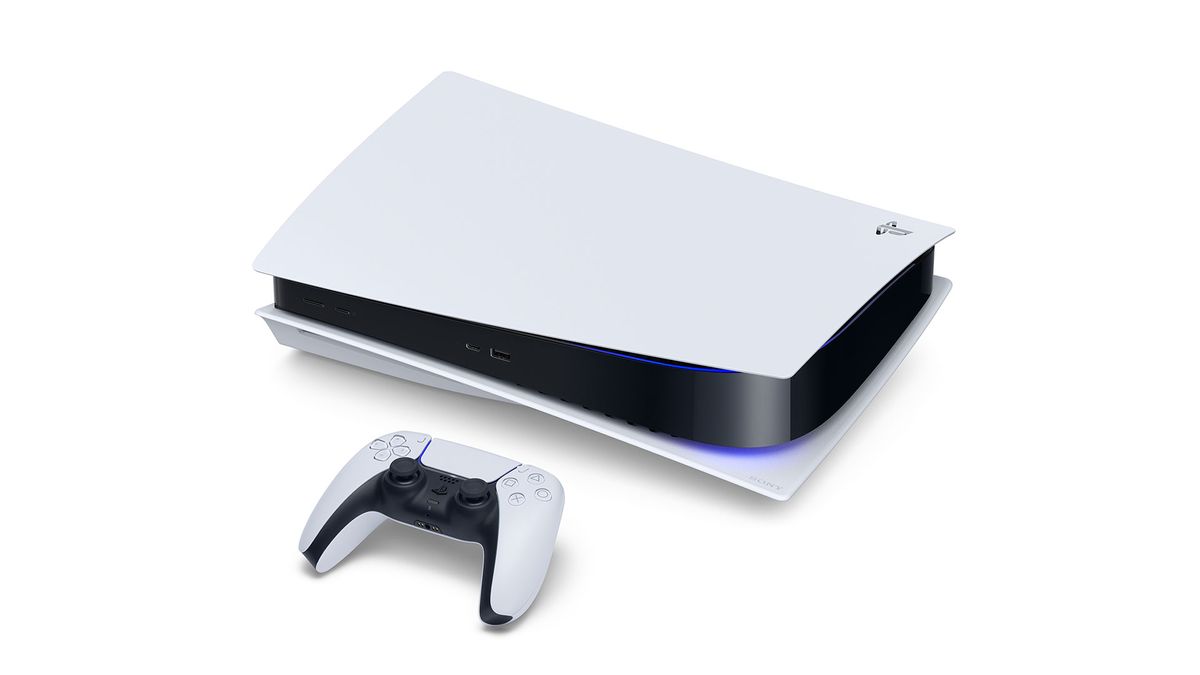
Have you got a PS5 yet? It's the gaming question on most people's lips in 2021. The launch of Sony's latest console has been an emotional roller coaster. From the highs of anticipation in November to the lows of scalpers snagging consoles ahead of genuine enthusiasts, it's been a wild six months since the PS5 launched on November 12, 2020.
Jim Ryan, the president of Sony Interactive Entertainment, has been doing the rounds making apologies of sorts for the limited supplies of PS5s. In doing so he's revealed more PS5s were sold in 2020 than PS4s back in 2013. Given the world is caught up in a global pandemic, that's impressive. To truly gauge how PS5 has fared, we're sitting down with developers who have, and are, creating for the console to see what the experts make of it.
How does the PS5 launch compare to previous generations?
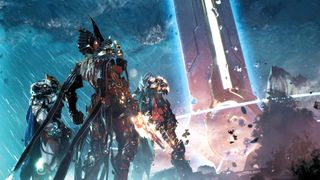

Have you read Play, the new magazine for PlayStation gamers? Subscribe to Play now to have every new issue delivered to either your door or digital device.
"It's hard to compare against previous launches given the dramatically reduced initial PS5 hardware supply due to the events in 2020," says Keith Lee, CEO of Counterplay Games and developer of Godfall. "That said, my experience setting up the PS5, navigating the new UI, and linking all my PS4 games felt seamless and intuitive – it's much better than previous iterations."
Other devs also have clear views on how PS5's launch compared to historic ones. Capcom's Matt Walker, producer on launch game Devil May Cry 5 Special Edition (which is an upgrade of the PS4 game that includes ray tracing, extra game content, and a 120fps mode) believes the launch didn't quite have the same impact as past PlayStation launches.
"At this early point, I'd put it between the PS3 and PS4," he tells us honestly. "The launch was an incredibly exciting thing for gamers, but it could have been so much more if Sony didn't have to deal with the complications caused by the pandemic."
Resident Evil Village game director, Morimasa Sato, agrees with Walker's sentiment, telling us that to him PS5's launch felt similar to the release of PS3. "Rather than being a complete change from the preceding generation, it's an evolution," he says.
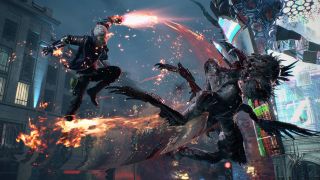
"At this early point, I'd put it between the PS3 and PS4"
Matt Walker, Capcom
Gearbox Software's senior graphics programmer Manuel Fernandez tells us he loved the joined-up thinking behind PS5's launch, which gave him a sense of progression similar to the one Sato enjoyed. "I think it was a strong launch and felt like a very seamless transition from PS4. In previous generations, you'd keep your last-generation console as you could be in the middle of playing something that you weren't able to take with you. But with the release of PS5, we had instant access to our PS4 library." It's telling that Gearbox was one of the big names to offer a free upgrade from last- to new-gen. On PS5, Borderlands 3 delivers 60fps at 4K and has a four-player split-screen mode.
Sign up to the 12DOVE Newsletter
Weekly digests, tales from the communities you love, and more
Giant Squid's Matt Nava says this console launch was a particularly personal moment. The Pathless was a launch game, a first for the developer. "It's a unique opportunity and a unique challenge to work with cutting-edge hardware. In many ways, we were some of the first guinea pigs helping to prove out the shipping process on PS5," he says.
"There were a lot of strong titles at launch and it was really neat to see The Pathless, the game that we have poured so much love into over the years, right up there with Spider-Man: Miles Morales and Demon's Souls. The launch occurred during a difficult moment in the ongoing pandemic, which I do think has hindered people's ability to get their hands on a PS5. I really hope that we see it become more widely available, as there's a lot of magical experiences to have with it."
What do developers think of the tech?

Supply troubles aside, Capcom's Matt Walker tells us he was impressed from the outset by Sony's vision. "Before I had even seen a dev kit, I had heard an explanation from our friends at Sony on what they were trying to achieve with PS5," he reveals. "I was super-impressed that there was a clear focus – to evolve the platform to keep players focussed on the games. I believe that the blazing-fast hard drive, the platform-integrated hint system, and the new Activities paradigm – when used right – will be able to evolve the way games are played on Sony platforms."
All the developers we speak with are excited at the technology Sony has crammed into PS5. The bespoke SSD is the headline act, but 3D audio, a user interface that connects us to our games in new ways, and the DualSense – the haptics-enhanced controller – all enable our devs to create games in fresh ways.
"Over the next few years, I'd expect that the SSD may be the biggest overall game-changer," says Keith Lee. "As we move from generic engine code designed to run on PS4 or PC to hand-tuned streaming pipelines developed specifically for the PS5 we should see amazing leaps in both content detail as well as the speed with which this content loads. This won't just mean denser open worlds that load faster, but super-detailed small environments."
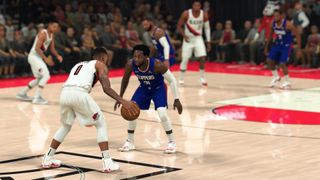
Over the next few years, I'd expect that the SSD may be the biggest overall game-changer
Keith Lee, Counterplay Games
The SSD comes top of our devs' list of most-loved PS5 tech. Kylotonn's Benoit Jacquier, technical director on the WRC series, tells us the SSD will change how we see games, saying: "Once players experience almost instant loading, they will never want to go back to old loading screens."
The Borderlands 3 team agrees, and have ensured the PS5 upgrade makes full use of the SSD. But the drive doesn't simply ensure faster loading times. "It wasn't just throwing in an SSD like you do on a PC to gain speed," argues Manuel Fernandez. "[Mark] Cerny rethought the whole way you access storage, removing bottlenecks and gaining more bandwidth than just what's available from the drive itself, multiplying the bandwidth through dedicated on-the-fly compression and decompression."
Erick Boenisch, VP, NBA development on the NBA 2K series (arguably one of the launch games that pushed PS5 furthest), reveals NBA 2K21 relies heavily on loading large quantities of data in seconds. He tells us the goal is never to let the player pause to put down the controller, and PS5 makes this happen. "When I played an early build of our game with Mike Wang, our gameplay director, and saw how fast it loaded, from our team select to playing a game at tip-off in literally two seconds, I was blown away by what this would mean from both a development standpoint and for our community enjoying our game," he says.
Morimasa Sato tells us the SSD and faster load times will change how horror games play. "The loading speed was what surprised me the most," he says when we ask for his first impressions of PS5. "Until now, we always had to work on ways to make loading not feel too long for players, but such quick loading made me feel like that era is over. The fact that loading time is basically nonexistent is going to have a huge effect on game design. Everything from the pacing of tension in a game to the music design is going to have to be rethought in terms of a completely seamless experience."

"Since the weight of the triggers would determine how shooting a gun felt, it was tricky deciding how much weight felt 'realistic.'"
Morimasa Sato, Capcom
New tech can give game creators headaches too. While Sato loves the SSD and its advantages for game design, he says the DualSense controller with its adaptive triggers caused some issues for the devs working on Resident Evil Village. "Since the weight of the triggers would determine how shooting a gun felt, it was tricky deciding how much weight felt 'realistic.'" He believes such challenges should be embraced, because Sony's console is dragging game design to new heights. "The PS5 expanded the possibilities of game development," he tells us.
Matt Nava says he was equally impressed with and dubious about DualSense ahead of the console's release. "Honestly I was sceptical of the DualSense, wondering if it would be a significant addition," he says. "However, after tuning it up and playing The Pathless with it for a week or so, I realised that I missed the feedback it was providing when I went back to testing on a PS4 controller. The DualSense motors have a wide range of effects they can achieve. I remember accidentally making it feel exactly like turning the key on a car that won't start. It made me realise that games could use this to create really interesting moments."
Indie devs love the DualSense controller too. Marek Markuszewski, CEO and project lead at Starward Industries, developer of the forthcoming PS5 Fallout-like The Invincible, says PS5 is redefining console gaming, even if it's not evident just yet. "As with every platform, software needs to catch up a bit. As soon as developers start feeling fully comfortable with the new platform, this is when magic is going to happen, exactly when the most talented coders start their tricks and tweaks unleashing powers which often leaves even the platform's designers in awe."
What does the future of PS5 look like?

So, what does the future of the PS5 look like? For Matt Walker, it means a continuation of Sony's push for AAA perfection. He says, "That will be the high watermark for the platform, that will continue to blur the lines between 'Best Picture'-grade cinema and the interactivity of games – and that will be the content that hardcore gamers will flock to."
We can all agree Sony's push towards cinematic gaming will only get stronger on PS5. The prospect of exploring the post-cataclysmic vistas of Horizon Forbidden West or God Of War 2 fantastical narrative sprawl on PS5 is tantalising.
For Keith Lee, the next big thing is ray tracing. Godfall's one of the key games to push the tech, and the developer sees this parity with PC development as an advantage for PS5, saying: "As a technology that developers can now rely on gamers having, we should see huge strides in how frequently it is used and what developers are able to push ray-tracing hardware to achieve. It'll be especially interesting to see what creative uses of ray tracing pop up beyond standard photorealism."
Lee drops the photorealism bomb. Ever since last year's stunning Unreal Engine 5 demo the prospect of tangibly lifelike worlds that smack us around the chops with authentic vitality has been right in front of us.
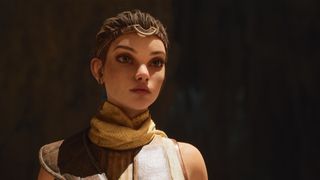
"It is exciting to think what kind of games we will be able to create if we are able to achieve that level of realism in real-time rendered graphics."
Morimasa Sato, Capcom
"It is exciting to think what kind of games we will be able to create if we are able to achieve that level of realism in real-time rendered graphics," says Morimasa Sato, adding: "At Capcom, we always strive to make impressive games and I think we'll be able to deliver even more surprising and realistic experiences this generation."
It's easy to see how narrative-led games can occupy realistic worlds. Capcom has already teased Pragmata, and Square Enix has the epic fantasy of Forspoken in the pipelines, but what about other genres? Codemasters' Robert Karp, development director on Dirt 5, says racing games will keep up with the pack. He explains: "I think it opens up brand-new possibilities… more cars on track, ray tracing, higher framerates, bigger tracks, better visuals… It's a great time to be a gamer and even better if you're a racing fan!"
Dirt 5 promoted the idea of tailoring games to how we want to experience them, with various graphics versus- performance modes. This could become standard as PS5 games enable us to decide how we want to play. Matt Walker says his team always wanted to embrace higher framerates, even before the tech to make it possible was in our hands: "Actually this has never been made public," he teases, "but even before we knew anything about PS5, even before Devil May Cry 5 Special Edition was greenlit, internally we were referring to the idea of DMC5 SE as '120Boost'. We had it in our minds that we'd be able to offer DMC5's gameplay at 120fps. Framerate has always been important to DMC; hopefully players find a new kind of enjoyment in playing it at 120fps."
The team at Arc System Works, developer of Guilty Gear Strive, say we'll need to be patient to really see what PS5 can do. A team representative tells us "the best experiences are delivered one or two years after the release of a new generation," as developers wrestle with the new hardware. In the meantime, they say, we should expect more free PS4-to-PS5 patches. "There is a lot of value for players to replay their favourite PS4 game with 4K or 60fps."

"The best experiences are delivered one or two years after the release of a new generation."
Arc System Works
We're fine with this. Some of the best experiences you can have on PS5 currently come from double-dipping into PS4 games enhanced for PS5. The likes of Days Gone, Ghost Of Tsushima, and God Of War feel fantastic running on our curvy white box.
Looking back to the future, though, we predict sports games will push PS5 to its limits in the years to come. We've already seen NBA 2K21 come closer to its TV-broadcast-quality ambition on PS5. With over 150 real-time actors in the arena, behaving organically, with cheerleaders, cleaners, and fans acting in lifelike ways, the game has a realistic atmosphere. Photorealism can be AI-driven. Erick Boenisch tells us they've only just 'tipped off'.
"Looking at gameplay, the raw power of the console allows us to run more complex engines within our AI architecture. With more overhead, we can run more complex calculations consistently, which allows us to deliver a significantly more robust, more realistic, and more lifelike experience to our fans," he explains. "I have no doubt other developers will also be able to push the console's power and their games even further and help elevate all aspects of gameplay and visuals as they spend more time with the PlayStation 5. I'm very bullish on our future, as well as the PS5's. It's an impressive console!"
Six months since release, having faced struggles with supply and the challenge of launching during a global pandemic, it feels like we've yet to see PS5 truly take off. The next six months offer an impressive lineup of exclusive games, including Deathloop, Kena: Bridge Of Spirits, and Ratchet & Clank: Rift Apart. But it's what comes after that period that will impress us the most. A year from now we could be blown away by what PS5 is doing.

For more fantastic PlayStation features like the one you've just read, consider subscribing to Play magazine – the number one authority on all things PS5. You can subscribe to the print or digital edition of Play by visiting Magazines Direct.
Imagine FX and Creative Bloq editor Ian Dean is an expert on all things digital arts. Formerly the editor of Official PlayStation Magazine, PLAY Magazine, 3D World, XMB, X360, and PlayStation World, he’s no stranger to gaming, either. He’ll happily debate you for hours over the virtues of Days Gone, then settle the argument on the pitch over a game of PES (pausing frequently while he cooks a roast dinner in the background). Just don’t call it eFootball, or it might bring tears to his eyes for the ISS glory days on PS1.
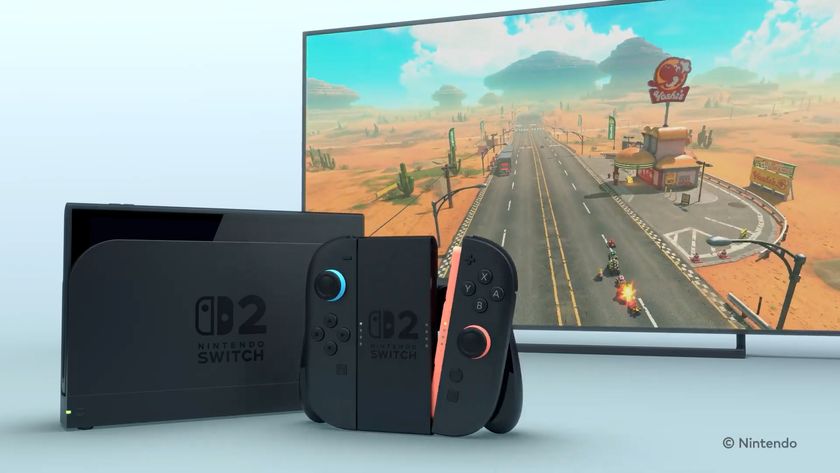
"If it can run on Steam Deck, it can probably run on Switch 2": Ex Nintendo marketing leads say Baldur's Gate 3 and Elden Ring prove there's a market for big AAA games on Switch 2

Here are my biggest Nintendo Switch 2 Direct predictions as the rumor mill kicks up questions about the console's price, launch lineup, specs, and more










